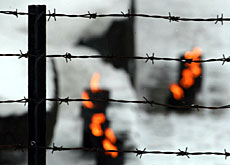
World commemorates victims of Auschwitz

Survivors of the Holocaust and world leaders, among them Swiss President Samuel Schmid, have remembered the horror of Auschwitz.
The solemn ceremony in Poland took place only days after the chairman of the World Jewish Congress (WJC), Israel Singer, stirred controversy about Switzerland’s neutrality during the Second World War.
At the commemoration marking the 60th anniversary of the liberation of the Nazi death camp at Auschwitz-Birkenau, more than 40 heads of state and government vowed that the atrocity must never be forgotten.
“The ceremony was very moving and touching. We once again had the very dark years of the history of mankind in our minds. We can only hope that history does not repeat itself,” said Schmid.
Among the invited guests were the presidents of Israel, Germany and Russia, representing the victims, the perpetrators and the liberators.
Up to one and a half million people died in the gas chambers and crematoria of the camp, set up by Nazi Germany in occupied Poland as the main centre of its “Final Solution”, the genocide of European Jews.
Auschwitz was liberated on January 27, 1945, by the advancing Soviet army whose soldiers released 7,000 emaciated prisoners left behind as the Germans withdrew.
Liberation
The liberation of Auschwitz, where gypsies, Poles and Russians were also killed, was remembered earlier this week at both the United Nations and at the annual meeting of the World Economic Forum in the Swiss mountain resort of Davos.
On Tuesday, Singer from the WJC described Swiss neutrality during the Holocaust era as “a crime”.
His remarks during a speech in the German capital, Berlin, have provoked anger in Switzerland.
The president of the Swiss Federation of Jewish Communities, Alfred Donath, described them as “unacceptable”.
In an interview with the Geneva-based Le Temps, Donath said he would lodge a protest at the European Jewish Congress, where he is a member of the presidium.
“We are going to demand not only an apology from Israel Singer, but also call for his resignation from the board of governors of the WJC because he has disgraced himself,” he said.
Call for apology
Donath added that Singer should apologise either to the Swiss government as a whole or to Schmid as president.
Federation spokesman Thomas Lyssy said that Swiss Jews did not share Singer’s assessment and added that neutrality was not the same as active collaboration.
Historian Jean-François Bergier, who compiled a wide-ranging and at times critical report of Switzerland’s wartime role, commented that he had no understanding for Singer’s remarks.
He added that Singer, as chairman of the WJC, knew that neutrality was “the only chance” for Switzerland in its difficult position during the war.
Foreign Minister Micheline Calmy-Rey told Swiss radio that neutrality at that time was aimed at protecting the Swiss from war and from Nazi activities.
“You should not mix the two. We were not Nazi actors. We did not kill, we did not take part in these horrific acts,” she said.
“The policy was both resistance and protection. And it is the normal task of a government to look after the security of its people.”
Criticism
Calmy-Rey added that the controversy was unwelcome at a time of remembrance for the victims of Nazi persecution.
“Today, it is time for contemplation, not for this type of argument.”
“Mr Singer is not a government. He’s the president of a major Jewish organisation and we will have the opportunity to tell him that his interpretation of Switzerland’s neutrality does not correspond to reality,” she added.
After Thursday’s ceremony, Schmid spoke in a similar vein. He said that the Swiss had experienced “very difficult times” during the war period.
He went on to describe Singer’s comment as “unjustified” and “not acceptable”.
“I have not yet had contact with representatives of the Jewish community. Mr Singer is not a head of state. If he is honest, we might expect him to say sorry. But that is his business.”
swissinfo with agencies
Thursday’s ceremony at Auschwitz commemorated the deaths of up to 1.5 million people persecuted by Nazi Germany.
World leaders vowed at the 60th anniversary of the liberation of the camp by Soviet soldiers that the atrocity must never be forgotten.
The 2005 Swiss president, Samuel Schmid, represented Switzerland.
Switzerland has denied that its neutrality during the Second World War was a crime, an accusation levelled at it by the chairman of the World Jewish Congress, Israel Singer.
Jews in Switzerland say his remark at a speech in Berlin was “unacceptable”.
Foreign Minister Micheline Calmy-Rey said the comment came at an inappropriate moment, when the world was remembering victims of the Holocaust.

In compliance with the JTI standards
More: SWI swissinfo.ch certified by the Journalism Trust Initiative






























You can find an overview of ongoing debates with our journalists here . Please join us!
If you want to start a conversation about a topic raised in this article or want to report factual errors, email us at english@swissinfo.ch.